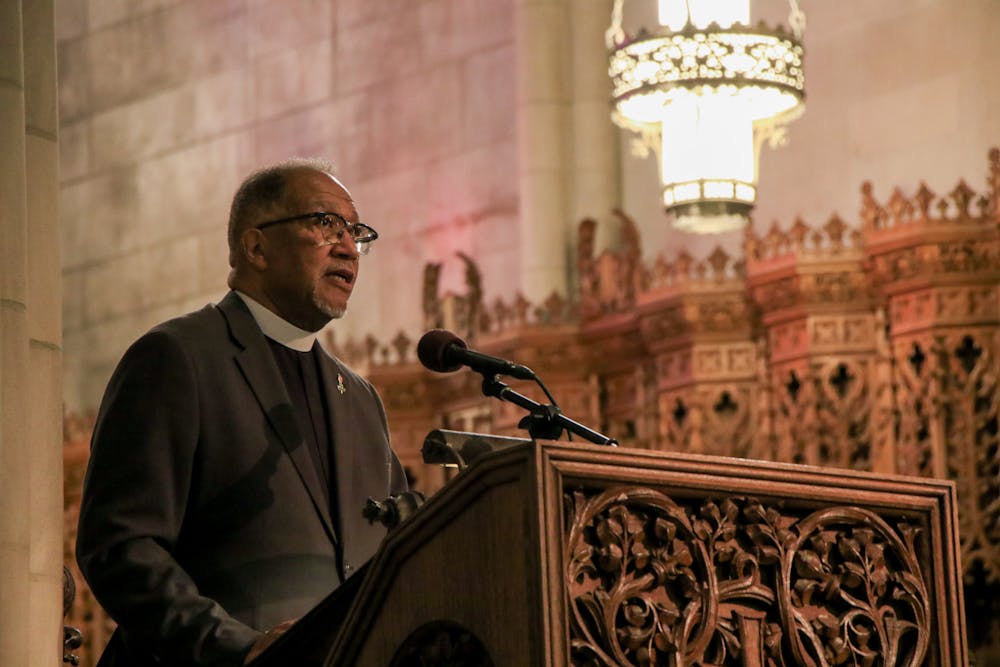A former colleague of Dr. Martin Luther King Jr. spoke to Duke community members beneath the stained glass windows and among the pews of the Duke Chapel on Sept. 15.
Civil rights activist Rev. Benjamin F. Chavis, Jr., Divinity School ’80, a recent recipient of the President’s Lifetime Achievement Award and former colleague of MLK, joined Catherine Coleman Flowers, current vice chair of the White House Environmental Justice Advisory Council and Nicholas School practitioner-in-residence.
The event, titled “Environmental Justice: Past, Present, and Future,” was hosted by the Sanford School of Public Policy as part of Duke’s Environmental Justice series and live streamed worldwide. It was meant to celebrate and highlight the anniversary of the 1982 Warren County protests, which ushered in a new movement and academic field and changed the course of history.
“In 40 years, we now not only have a movement in North Carolina, we have a movement all over the world. The environmental justice movement is a global movement,” Chavis said. “The future is what we shape the future to be.”
The opening statement was followed by a discussion and Q&A involving both speakers and moderated by Cameron Oglesby, a current graduate student at Sanford. Throughout the course of the discussion, the speakers addressed the history and origins of environmental justice, its importance on a local and international level, and more specific issues such as voter participation, climate justice in rural areas, and the role of Duke in continuing to propel the movement forward.
Chavis’ points focused primarily on the importance of unity in the movement, spanning across ethnic groups, private and public corporations, states and nations. He also highlighted that political involvement should be at the forefront, specifically via voter participation and electing leaders who have a heart for and background in environmental justice issues.
“On November the eighth, democracy is on the ballot. On November the eighth, environmental justice is on the ballot. On November the eighth, climate justice is on the ballot. On November the eighth, racial justice is on the ballot,” Chavis said.
Chavis was the youngest person to be elected Executive Director and CEO of the NAACP. He stepped into the role in 1993, but was then fired in 1994.
Chavis is also credited with coining the term “environmental racism.” In the 1960s, he worked alongside MLK, and in the following decade, was unjustly incarcerated for his involvement in the Warren County protest.
Coleman is an author, MacArthur Grant recipient, and founder of the Center for Rural Enterprise and Environmental Justice, who has devoted her career to researching and raising awareness about environmental inequities in rural and marginalized communities.
Using her expertise regarding poor sanitation in rural communities, Coleman honed in on how collaborating globally to improve sanitation can help those who are historically marginalized, for example, by “using the Human Rights Framework [and] Sustainable Development Goals.” She also cited her experience working abroad and at the White House in order to highlight the importance of collaboration and exchange programs.
Both speakers agreed that though the movement has made significant progress, there is still more to be made. Still, they expressed that they are hopeful and optimistic because of the number of young people, including at Duke, passionate about the environmental justice movement.
“On this 40th anniversary as an optimist I’m encouraged because I see young people. Young white people, young Black and Latino people, young Pacific Islander and Asian people. I see young people demanding climate justice. Not waiting for the politicians and not even waiting for the public policy makers,” Chavis said.
He continued with a lesson he learned from his time working with MLK stating, “it’s not just good enough to see an injustice. We [have to] have the courage to challenge that injustice, to change that injustice.”
“And we have nothing but opportunity today. We should want clean air, clean water, good healthy food for all people,” Chavis said.
At the event’s conclusion, sophomore Meghna Parameswaran, who attended due to her involvement in a Bass Connections project and interest in environmental justice, called the event “beautifully organized.”
“As soon as they walked out and started speaking, I had tears in my eyes,” Parameswaran said.
“Just being in the presence of these amazing and great people has motivated me to want to do anything that I can to be a part of this movement and to be in community with people like them.”
Get The Chronicle straight to your inbox
Sign up for our weekly newsletter. Cancel at any time.
Jianna Choi is a Trinity sophomore and a staff reporter for the news department.

